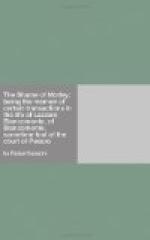“Alas!” I sighed. “God knows I am no longer fit to sit in the house of the Biancomonte. I am come too low, Madonna.”
“That Lazzaro, after whom you are named,” she answered, “had come yet lower. But he lived again, and resumed his former station. Take your courage from that.”
“He lived not at the mercy of Giovanni of Pesaro,” said I.
There was a fresh pause at that. Then—“At least,” she urged me, “you’ll come to Pesaro with me?”
“Why yes,” said I. “I could not let you go alone.” And in my heart I felt a pang of shame, and called myself a cur for making use of her as I was doing to reach the Court of Giovanni Sforza.
“You need fear no consequences,” she promised me. “I can be surety for that at least.”
In the east a brighter, yellower light than the moon’s began to show. It was the dawn, from which I gathered that it must be approaching the thirteenth hour. Pesaro could not be more than a couple of leagues farther, and, presently, when we had gained the summit of the slight hill we were ascending, we beheld in the distance a blurred mass looming on the edge of the glittering sea. A silver ribbon that uncoiled itself from the western hills disappeared behind it. That silvery streak was the River Foglia; that heap of buildings against the landscape’s virgin white, the town of Pesaro.
Madonna pointed to it with a sudden cry of gladness. “See Messer Biancomonte, how near we are. Courage, my friend; a little farther, and yonder we have rest and comfort for you.”
She had need, in truth, to cry me “Courage!” for I was weakening fast once more. It may have been the much that I had talked, or the infernal jolting of my mule, but I was losing blood again, and as we were on the point of riding forward my senses swam, so that I cried out; and but for her prompt assistance I might have rolled headlong from my saddle.
As it was, she caught me about the waist as any mother might have done her son. “What ails you?” she inquired, her newly-aroused anxiety contrasting sharply with her joyous cry of a moment earlier. “Are you faint, my friend?” It needed no confession on my part. My condition was all too plain as I leaned against her frail body for support.
“It is my wound,” I gasped. Then I set my teeth in anguish. So near the haven, and to fail now! It could not be; it must not be. I summoned all my resolution, all my fortitude; but in vain. Nature demanded payment for the abuses she had suffered.
“If we proceed thus,” she ventured fearfully, “you leaning against me, and going at a slow pace—no faster than a walk—think you, you can bear it? Try, good Messer ’Biancomonte.”
“I will try, Madonna,” I replied. Perhaps thus, and if I am silent, we may yet reach Pesaro together. If not—if my strength gives out—the town is yonder and the day is coming. You will find your way without me.”




